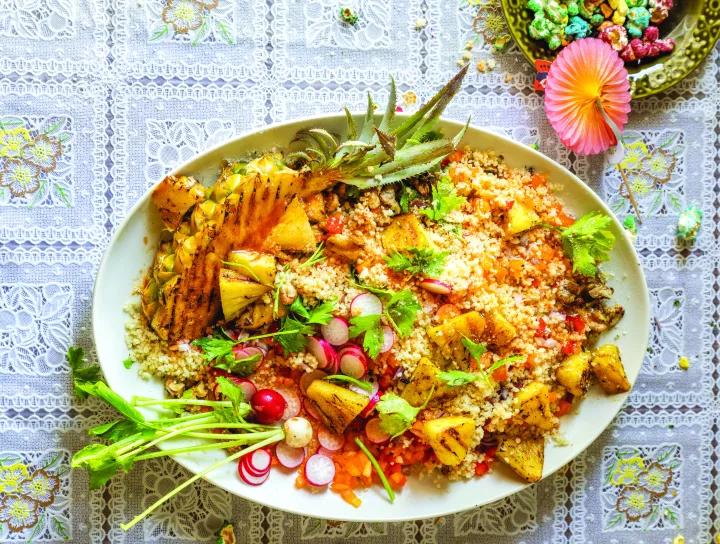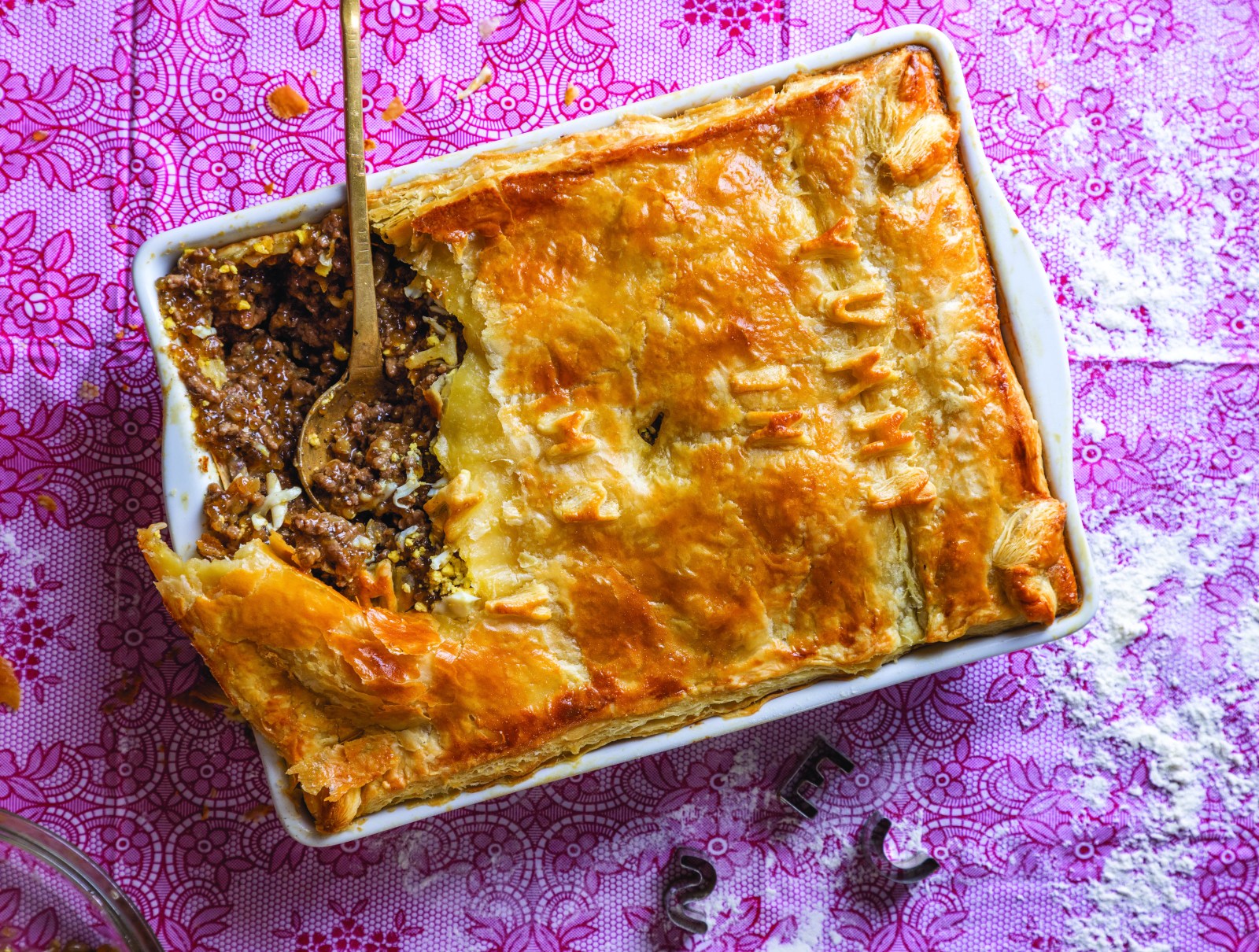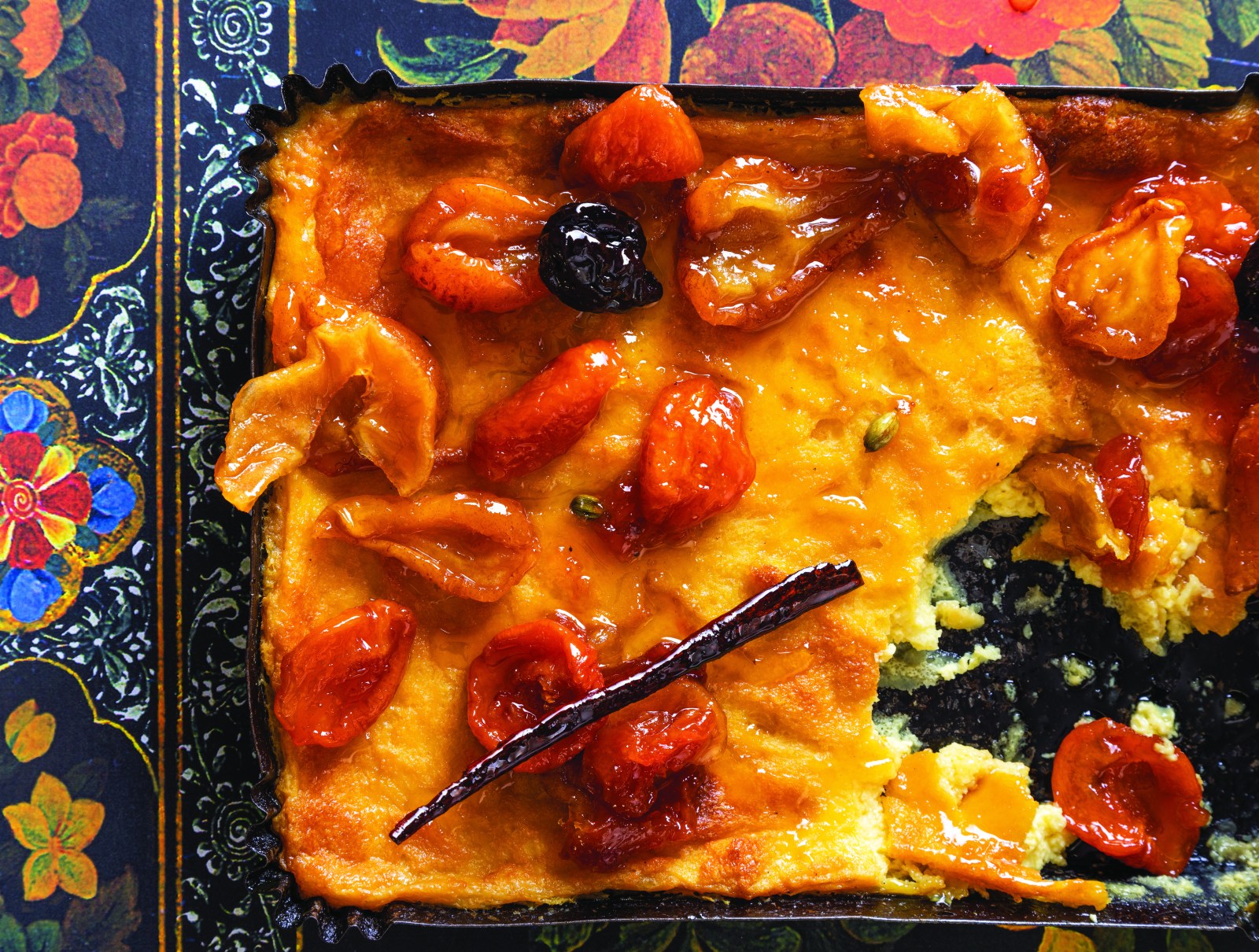QUEEN OF SPICES
Fatima Sydow’s food and life stories are gems to treasure

So many cookery books are published but few of them get right to the point with a clear, concise and relevant formula. Fatima Sydow, in her new work Cape Malay Cooking, goes against the humdrum grain. And it’s an absolute beauty of a book, packed with insights.
Strange how Cape Malay cooking, even at the very Cape itself, is relegated to a back room as if it’s not really good enough. Why is that? Is it a race-based dismissal? A shoving aside of an entire cuisine as if to say, it’s what they eat on the Cape Flats but is it really anything to write home about? This wonder of a cuisine features only randomly on Cape menus, which is atrocious to the point of shocking. Yet it’s a cuisine that ought to be celebrated.
Enter Fatima Sydow, the new reigning queen of contemporary Cape Malay cuisine. Her new book can only become a classic, as it will be hard to better. Scanning my extensive collection of cookery books, I can think of few that can match it.
The full title is Cape Malay Cooking, My Story, My Heritage, and it is part cookbook, part memoir, in the popular contemporary style. She writes about “my beloved family”, memories of Ramadaan and Labarang, moving on to insights into wedding fare and traditions and ending with a chapter entitled Festive Fun. Everything is laced with superb photography by Donna Lewis and design by Wilna Combrinck.

Labarang mince pie. (Photo: Donna Lewis)
Those sections are interlaced with shorter chapters. Sydow has a mellifluous writing style that takes you to the places and memories she shares: “The golden chicken leaned over the buttery skwasies, the squash, and winked charmingly at the other sides … sweetcorn, sweet butternut, cauliflower with cheese sauce and so many more. Next to the roast sat a deep bowl filled to the brim with fragrant reddish-orange curry waiting to be scooped up by a flamboyant flaky roti.”
And, joy of joys, her recipe for exactly that, flaky roti, follows a few pages later. I will certainly be giving it a go, this being something I have long been wary of tackling. Sydow gives me the courage to try. There’s a pictorial guide which always makes a taxing recipe much easier. It is seeing those photographs that gives me the gees to do it.
Sundays, she writes, were family days. “Indian music or songs by The Platters & Peaches and Herb playing softly in the background, my mother singing along. Pots and pans taken out, and then she would shout … ‘Skrik wakke! Amie Kaa, Amie, Amie Dullah, Nazli en Big Boeta, Mama, Amie Nassa en Auntie Dielie en al die kinnes is op pad, hie is nie genoeg hoenne nie en Poenas kom en Auntie Nangkies. Gaan vra gou vi’ auntie in die hoek vir ‘n box hoenne op skult. (Paraphrased: Wake up! We’ve got a crowd coming over and there’s not enough chicken. Run and ask the aunty on the corner for a box of chicken on credit.”
There follow recipes for family favourites. Chicken and tomato one-pot pasta, hertzoggies, and salt and pepper chicken.
Some deep nostalgia follows in a mini chapter titled The milk man and the corner store. “When I was a child the milk man used to deliver milk, orange and guava juice in plump glass bottles, leaving them on the doorstep just as the sun was rising … I walked with my cousins to the corner shop with two cents in my pocket to buy sweets, or in summer a sweet, juicy peach.
“The smells in the shop were enticing, a mixture of fruit, sweets, spices and miangCRT stokkies (incense). Walking back, we would pick up pine cones bristling with pine nuts along the street; they were plentiful.”
To follow that, hearty fare such as bread pudding with stewed dried fruit, brown stew, dhal curry, haddock pasta, sugar bean curry and many more, including lentil and potato curry, oven-baked fish breyani and toffee apples.

Bread pudding with stewed dried fruit. (Photo: Donna Lewis)
Sydow recalls the moment she fell in love with spices. “My love for spices began the day I first noticed a bright yellow powder when mom was making a curry. I was convinced it was the sand of the sun. It was, however, that queen of all spices, turmeric. She was standing proudly next to her king, the chilli powder. I learnt that day that together they do a dance that fills the world with magical aromas and flavours.”
That is magical writing.
Her insights into Ramadaan as it is observed at the Cape (and fast-breaking habits are different in many parts of the world, just as Ramadaan is spelt Ramadan elsewhere; we add an ‘a’ to samoosas too) are intimate and personal.
“In the late afternoon during the month of Ramadaan, my mother would call us to the kitchen to help her with preparing what would be eaten that evening to break our fast. And every night without fail it was, and still is to this day, a simple split pea and vegetable soup with marrow bones. Not a meal like curry and rice, just soups and cakes and savouries. I fondly called them the usual suspects: daltjies (chilli bites), fritters, bollas, pancakes, samoosas, koesisters, almost all of them laden with spices. Imagine the aromas filling the kitchen – actually the entire neighbourhood as we prepared the treats.”
What else to follow but a hearty chicken soup, split pea soup, cocktail naan rolls (another recipe that intrigues me), half moons with chicken and cheese filling, and spicy prawn and cheese spring rolls. Daltjies and boeber feature too, along with samoosas.
She devotes a short chapter to “Teaching old skills to a new generation”, the context being the humble samoosa. And while “samosas” (spelt that way almost everywhere else) are a feature in many world city cuisines, they are nevertheless as integral to the Mother City as the Cape Doctor and the mountain itself.
Nobody, she points out, would get shop-bought samoosas back in the day. The clan would gather and everyone would fold.

Naan rolls. (Photo: Donna Lewis)
“There was one specific day I will never forget. We were living in Strandfontein village and as so often happened, family and friends were gathering at our home. They came from far and wide, this one getting a lift from that one and so on and so on, and the house was filled to capacity.
“Auntie Dielie from Manenberg, Auntie Lyla and Boeta Taypie, Auntie Shireen and Boeta Ismail, Auntie Maghdi and Auntie Wadi, Auntie Haji and Poena and Auntie Girl, just to mention a few. We sat around a very old but strong coffee table in the yard under the afdakkie. On the table was a big bowl of mince filling for the samoosas and samoosa leaves in the centre, and then the folding started, this one making fun of that one’s samoosa shape.

Samoosas. (Photo: Donna Lewis)
“From there the samoosas went straight to the person doing the deep frying, a task given to anyone who happened to be standing near the pot of oil heating up. My mom would give you something to do and you could not say no. And that is how we learnt so many skills.”
And skills she has indeed learnt to the extent that, like Auntie Turmeric, Queen of Spices, Fatima Sydow now reigns as Queen of Cape Spices. Long may she. DM/TGIFood





Aaah, just loved this! Going to find the book, for sure. But not only for the tastes, but also for what is conjures up – a warm, old, inclusive tradition which I was never part of, but, having grown up in Cape Town, I saw every now and then. And occasionally, I would be fortunate to taste the samoosas, the breyani, the bobotie…. Homemade, delicious, warming…
The very thin selection of restaurants serving good, authentic cape Malay food is a mystery. That which is worth seeking out is mostly available only for take-away or a few spots in the City Bowl with limited seating. I was bereft when Bibi’s closed their restaurant in Wynberg, but the take-away remains and does a roaring business, as do the Wembley Roadhouse and Maryams Kitchen. Perhaps the restriction on serving alcohol is a disincentive for some non-Muslim diners. It really shouldn’t be.
The Cape is wine country, and it is difficult to match many of the spicy dishes with wine.
Could this be the issue?
Dammit Tony, now you’ve gone and made it absoolutely (extra o inserted) essential I order Fatima’s book …..
My wife found Fatima on YouTube and I and my family have been the recipient of many of her splendid meals that have not only delighted our senses and palettes but filled our house with amazing aromas.
We thank the Lord for her love and passion for sharing her talents with everyone. Just try one of her recipes, now famous, and you will immediately fall in love with Cape Malay cooking.